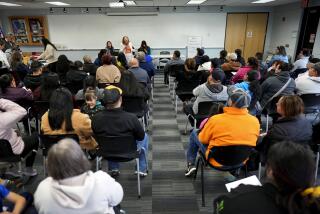Immigration, state by state
Fueled by frustration, states are striking out and creating their own immigration rules.
Utah is the latest state to consider a local fix to a federal problem. Lawmakers this month passed a package of reforms that includes granting police broader powers to check the immigration status of those arrested and creating a state guest-worker program for illegal workers.
And more than a dozen other states are pushing immigration legislation that ranges from the benign to the ridiculous. In Oklahoma, for example, lawmakers are seeking to ban motorists from picking up illegal day laborers, while South Carolina’s Legislature is considering making it a felony to sell a fake ID to immigrants who are in the U.S. illegally.
So far, none of the proposals go as far as Arizona’s draconian anti-immigrant law, known as SB 1070, that requires people to carry identification proving they are authorized to be in the U.S. But like Arizona, other states that adopt immigration enforcement measures will probably face legal challenges over attempts to encroach on the federal government’s authority.
The flurry of proposals should serve as a wake-up call to Washington. Congress has failed in the last few years to provide a comprehensive solution to the nation’s broken immigration system and instead has wasted time sparring over building bigger fences and funding stricter enforcement programs. The White House hasn’t done much better. President Obama has spoken eloquently about the need to overhaul immigration but has offered little else.
Washington can’t continue to abdicate its authority to the states. Lawmakers and the White House must begin the conversation and provide some legislative action.
Meanwhile, Congress can provide some short-term relief. Lawmakers should revive the Development, Relief and Education for Alien Minors bill, known as the DREAM Act. The bill would provide a conditional path to legalization to young illegal immigrants who attend college or serve in the military and plan to address the nation’s need for skilled and unskilled labor.
And Republicans and Democrats can also reconsider legislation to help farmers. Last year, Sen. Dianne Feinstein (D-Calif.) and Rep. Howard Berman (D-Valley Village) sponsored the Agricultural Job Opportunities, Benefits and Security Act, or AgJobs. The bill remains a viable approach to helping farmers by providing temporary work permits for certain types of farmworkers and their families who are in the U.S. illegally.
More to Read
A cure for the common opinion
Get thought-provoking perspectives with our weekly newsletter.
You may occasionally receive promotional content from the Los Angeles Times.






